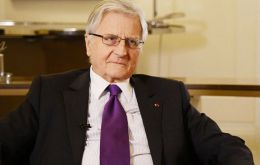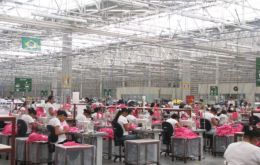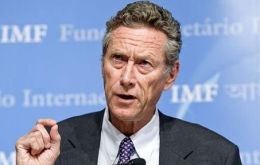MercoPress. South Atlantic News Agency
Tag: emerging economies
-
Tuesday, January 11th 2022 - 13:45 UTC
Emerging Economies Must Prepare for Fed Policy Tightening

IMF Blog by Stephan Danninger, Kenneth Kang and Helene Poirson (*) – For most of last year, investors priced in a temporary rise in inflation in the United States given the unsteady economic recovery and a slow unraveling of supply bottlenecks.
-
Saturday, July 27th 2019 - 09:39 UTC
BRICS' ministerial summit can't agree on Venezuela, despite “people's cries for freedom”

Brazil's Foreign Minister Ernesto Araujo on Friday pleaded with the country's partners in the BRICS group of emerging economies to heed the “cries” of Venezuelans and work together to end the crisis.
-
Saturday, September 22nd 2018 - 07:08 UTC
Trichet: Brexit will hit harder the UK than the EU, and “it is totally contrary to the new world”

Brexit will have a bigger economic impact on the UK than the European Union, the former head of the European Central Bank has told BBC Radio 5 Live. Jean-Claude Trichet added the break-up was “totally contrary to the new world” of large emerging economies, with single currencies and single markets.
-
Tuesday, July 24th 2018 - 04:28 UTC
IMF underlined financial pressures risks for vulnerable emerging economies

The IMF urged that trade conflicts be resolved via international cooperation, without resorting to exceptional measures, and underlined the world economy is facing increasing risks especially financial pressures in vulnerable emerging economies and the return of sovereign risks in parts of the Euro area.
-
Thursday, June 12th 2014 - 06:53 UTC
World manufacturing on the upturn but fragile in emerging economies

World manufacturing is in a phase of steady growth due to the improved financial condition of industrialized countries, especially in Europe, and China’s continued growth, the United Nations reported on Wednesday.
-
Wednesday, October 31st 2012 - 20:51 UTC
India/Brazil with highest government debt/GDP ratios among leading emerging economies

India and Brazil have the highest government debt ratios at almost 70% of GDP among top ten emerging market economies, according to a report by Deutsche Bank.
-
Tuesday, November 1st 2011 - 21:12 UTC
Latin America will demand at G20 summit greater voice for emerging economies

The Latin American block arrives this week at the G20 summit in Cannes with a consensus spearheaded by the strong political standing of Brazil in global affairs and with criticisms to the way in which the European Union and the US are managing their respective “crises”.
-
Wednesday, July 27th 2011 - 03:41 UTC
Global demand for oil will increase in 2012 driven by emerging economies

Global oil demand will increase further next year, the International Energy Agency (IEA) has predicted. The IEA, which represents the main oil consuming nations, said the increase in crude usage would continue to be driven by emerging economies.
-
Thursday, June 9th 2011 - 00:54 UTC
Bernanke argues strong demand for commodities is depressing US dollar value

US Federal Reserve rejected criticism that its actions (‘accommodative monetary policy’) have pushed down the foreign exchange value of the US dollar and thereby boosted the price of commodities, adding that the Fed is “fully committed” to maintaining the dollar’s purchasing power and to keeping inflation in check.
-
Saturday, May 28th 2011 - 07:24 UTC
Even if US tightens liquidity, hot money to emerging economies will continue

Capital flows to emerging markets won’t significantly slow when the US Federal Reserve ends its bond-purchasing program known as quantitative easing, said Olivier Blanchard, chief economist at the IMF.
